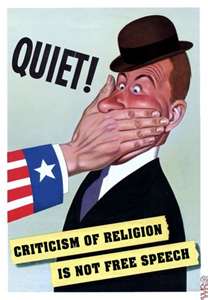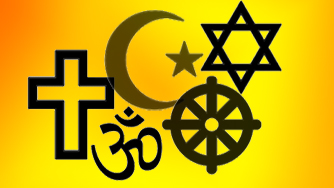 I think one of the most interesting clauses in the Constitution of the United States is that of the First Amendment’s Freedom of Religion. Recent events bring up intriguing issues in regards to its enforcement and that is the topic of my blog today.
I think one of the most interesting clauses in the Constitution of the United States is that of the First Amendment’s Freedom of Religion. Recent events bring up intriguing issues in regards to its enforcement and that is the topic of my blog today.
Anyway, let’s start with the actually wording of the clause, “Congress shall make no law respecting an establishment of religion, or prohibiting the free exercise thereof;”
This clause is often referenced as the Establishment Clause and is generally interpreted to:
- Prohibit the establishment of a national religion by Congress
- Prohibit the preference by the U.S. government of one religion over another
Early on there were established State Religions and generally prior to the Fourteenth Amendment this clause was interpreted to restrict the federal government but not the states. In fact, eight states still legally refuse to allow Atheist to hold office although the Supreme Court has ruled this unenforceable.
The Due Process Clause of the Fourteenth Amendment is an extremely interesting subject and perhaps I’ll take that on in a future blog. Basically, this clause has expanded the interpretation of the Establishment Clause to the states. So that now individual states are under the same restrictions as the federal government. I could spend quite some time discussing the relative value of this expansion but it’s not really the topic I’d like to take on today.
Today I want to discuss how individual and organizational religious beliefs are now being protected. There are any number of cases working their way through the courts but the gist of all of them is that an individual or group is immune to legal requirements because of their religion. For example, a Catholic pharmacist can refuse to prescribe birth-control pills or a hospital might be able to refuse to provide contraception to workers on their health plan. A deeply religious person might be able to legally assault someone who offends their belief system.
Freedom of religion cuts both ways.
The idea that the federal and state governments must allow people to worship religiously of their own accord with no undue influence is, in my opinion, a good plan. The original clause is relatively simple, the state cannot force me, in any way, to worship a particular religion. They cannot lead me in forced prayer, they cannot force me to attend a particular place of worship, they cannot pass a law making my belief system illegal.
The problem comes in defining worship. There are no easy answers here. Is beating up atheists a requirement of my religion? Is killing infidels a requirement of my religion? Does my opposition to birth control make me immune to a law that requires me to pay insurance benefits? It’s an endless debate that grows ever more complex and threatens religious freedom for Atheists, Christians, Wiccans, Muslims, Taoist, and all the rest.
As a Libertarian I think a much more restrictive interpretation solves a great number of these issues. If we simply prevent the establishment of religion by the state and prevent laws giving preference to one religion or another we go a long way towards eliminating these questions. If a hospital is legally obligated to pay for health insurance they must do so. If a man assaults another he must face the consequences. If a teacher leads a non-mandatory prayer then they can do so. If a state wants to say a prayer before assembly they can provided it is not mandatory and penalties are not applied to those who don’t take part. A school must be allowed to cover the ideas evolution and creationism but cannot only teach one.
Don’t enforce your religion on me. It’s that simple. Believe what you will but established laws otherwise apply.
This one is sure to anger people on both sides of the political landscape but hopefully I’ve explained why a Libertarian point of view, in which the state’s influence is minimized, is often best at preventing the majority from enforcing their will on the minority and allows us all our freedom, religious or otherwise.
Share, Comment, Like, Tweet, Pinterest, Plus1, and otherwise let your friends know about this blog if you think they might be interested.
Tom Liberman
Sword and Sorcery fantasy with a Libertarian Twist

We often disagree on politics, but I am in complete agreement with you on this one!
Here in Australia we have a similar provision –s.116 of our constitution. There are slight differences in wording, and these have been held to be significant by our High Court. There are also obvious differences in history as well. For example no Australian state ever had a State Church – although we came very close to establishing the Church of England by default in the early colony. What you are suggesting as to how the American First Amendment should be interpreted is in essence how our s. 116 is interpreted. As a believer or non-believer you have freedom of religion within the laws set down for general society. This has led to a debate that is known as the action-belief dichotomy. There is a good academic paper on this by Gabriel Moens http://www.austlii.edu.au/au/journals/SydLawRw/1989/9.html
I only read the first couple of pages but quite an interesting case and it does seem to correspond with my views on the subject. For all my legal-eagle family members and friends (this means you dad, sarah, clyde, and anyone else I’m forgetting) you should look at that article! Very interesting.
Thanks again, Renae,
Tom